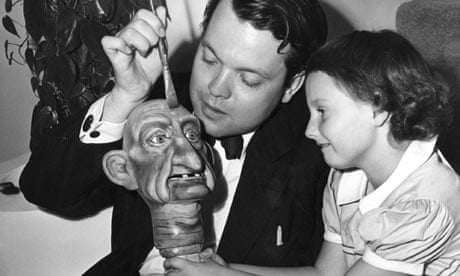It can be tough being the child of a star, and being the eldest of Orson Welles's three daughters was no exception. She got off to a pretty poor start when he elected to call her Christopher. "Wait and see, darling girl," he said. "The day will come when you'll love your name and thank your old father for having christened you while you were still in your mother's womb." As she chose to write the book under the name of Chris Welles Feder, it's safe to assume Welles Sr was wrong on that one.
It should have been a wonderful childhood, and much of the early part was. Born in 1938, Chris grew up in the golden years of Hollywood. Her adoring and fun father was around, even after he divorced her mother, actress Virginia Nicolson, in 1940. Next up was Rita Hayworth, whom he married in 1943, and weekends at her house were memorably happy for Chris. "Rita was everything a child could wish for in a stepmother: sweet-natured, affectionate, fun-loving and, in many ways, a child herself." Chris was freed from her Scottish nanny and strict mother for those magical weekends.
By 1947, Welles had left Hayworth and moved in with actress Geraldine Fitzgerald in the next-door Santa Monica house to Chris, her mother and stepfather. The two households got along fine. Welles was often in the garden writing – although he would soon leave for Europe and never return permanently. Chris would spend happy days playing with Geraldine's son, Michael Lindsay-Hogg (now a TV and theatre director). Years later when she met up with Geraldine in New York at an Orson Welles seminar, she was to speculate: "'Why should Michael want to be here?' I wanted to ask her. Did that mean the persistent rumours were true and Michael was my father's natural son?"
Shortly after this comparatively settled period, her father left for Italy and Chris was sent to Orson's old school in Illinois. From this point on her childhood effectively ended. Her morose mother married an uptight Englishman and settled in South Africa, readily adopting the attitudes of white South Africans in the 1950s. Chris could do no right in her new stepfather's eyes and, after an unhappy time at boarding school there, she was sent to a finishing school in Switzerland. She rarely saw her father, who was now married to his third wife, Paola Mori, with another daughter on the way. "The trouble is that Orson has no idea how to be your father," Chris's mother told her.
It was only as she got older that Chris began to realise the significance of her father's work and the regard in which it was held. The fans and autograph hunters exasperated her, although Orson treated them with the utmost courtesy. Often in restaurants – once at a picnic in a remote spot – people would strike up the theme from The Third Man.
But this is far from a bitter tale. There were woeful times when Orson would fail to show up and Chris would stand by the front door all day, waiting for the sound of his car, but he was a doting father when they were together and they had some wonderful holidays looking at art in Italy, and having lunch with the Oliviers at their English country house.
"Your father's death will liberate you in the long run," her brother-in-law told her, and he was right. But it had been a long time before she could step out of his shadow.

Comments (…)
Sign in or create your Guardian account to join the discussion